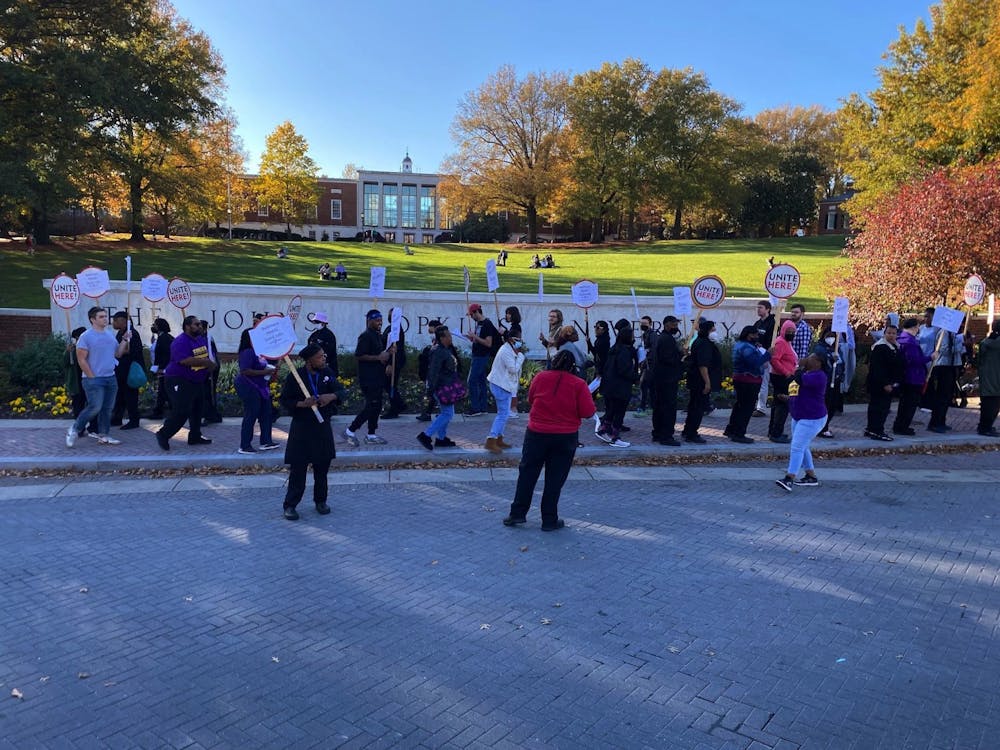Hopkins Dining employees held a picket line demonstration on Nov. 2 to protest the treatment of food service workers at the University. The Hopkins Dining union, represented by UNITE HERE Local 7, presented their finalized negotiations to the University on Nov. 4.
Earlier this year, the University established a new dining program to take food service employees in-house. Previously all food service employees were employed by contract.
Roxie Herbekian is the president of UNITE HERE Local 7. In an interview with The News-Letter, Herbekian stated that negotiations with the University regarding wages, insurance, vacation time and sick leave for food service employees are going well. According to her, the contentious issue is job security.
Although food service employees have been brought in-house, the University continues to employ additional food service employees via a temporary agency, which are not covered by the union.
Herbekian described the issues this poses.
“People in Baltimore need decent jobs, and we believe these can be decent jobs, but we don't want to negotiate just for a little island of people,“ she said. “We want there to be a standard for all food service workers on campus.”
In an email to The News-Letter, Assistant Vice President for Media Relations and News J.B. Bird explained the University’s reasons for continuing to employ workers via a temporary agency.
“[Hopkins Dining] will have our long-time workers at its core, with a minimum of 175 guaranteed union positions supporting our undergraduate dining operations,“ he wrote. “Hopkins Dining will also be supporting Baltimore’s local economy more than ever before... by creating opportunities for local minority-and women-owned food vendors on our campuses.”
Bird stressed that no Hopkins food service employees will lose employment as a result of these outside vendors. He stated that the outside vendors’ employees will be required to receive a living wage, but the decision to unionize is up to those employees. He added that the University will require vendors to comply with labor laws if their employees do seek to unionize.
Herbekian explained that some issues were resolved during the negotiations on Nov. 4. However, issues with job security and the use of temporary employees were not resolved to the union’s satisfaction.
Herbekian added that after the Nov. 4 negotiations, the employer made some new proposals. The union stated they would require another meeting to review the proposals, but Hopkins has not agreed to meet with the union again.
She expressed her disappointment with this outcome.
“This is a very proud group of food service workers, and we’re trying to adjust and make this work in a new environment,” she said. “It’s hard to do that when the University is shutting down communications.”
At the picket line demonstration on Nov. 2, Hopkins Dining employee Marvel Brandon described her reason for protest in an interview with The News-Letter, emphasizing that the main issue she faces is job security.
“They might decide they don’t want the headache and then we’re out of a job if someone decides to come in and take over,” she said. “All we want is our job secured, so if another company come in then we still can work.”
Sophomore Ty’Shera Mintz expressed her disappointment with the University’s treatment of food service employees in an email to The News-Letter. She speculated that their mistreatment is the result of racism.
“Am I surprised? No, because we all acknowledge that the dining workers are African American, of course Hopkins would treat them with such dishonor,” she wrote. “[Hopkins has] showed us countless times [that] they don’t care about the African American population on their campus and this is starting to become a nightmare.”
According to the University's 2020 Report on Staff Compensation, 75% of service workers were Black in 2019. Only 10% of executive and administrative workers were Black in 2019.
In an email to The News-Letter, sophomore Noah Walch asserted his support for the union.
“It’s disappointing that Hopkins made the swap to self-managing food service without a plan to foster safe, well-paying jobs,“ he wrote. “If applying direct pressure on the university is the only way to change the current state of things, I fully support food workers in doing so.”
London Craddock and Shirlene John contributed to the reporting for this article.





